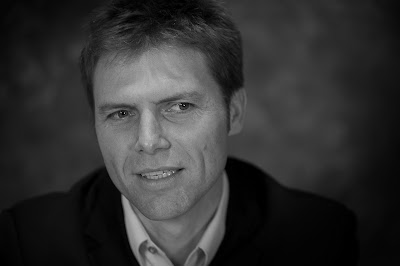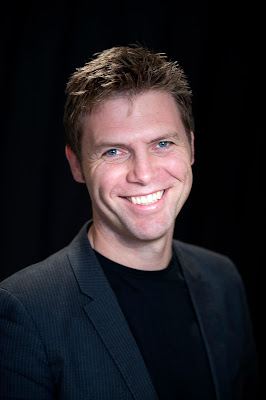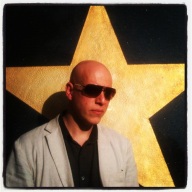 |
| Steward at Boring 2012 "I made the badge myself" |
I first came across
James Ward (who is not the gentleman above) via a couple of tweets from
Caitlin Moran.
Caitlin is successful, brilliant and famous (my younger daughter Abi's middle name is Caitlin, as a tribute to her).
However, not that many people know about
James Ward. My son is called James, but this has nothing to do with James Ward. He will be relieved by this, and disappointed.
I read
James' excellent blog and got in touch with him.
We tweeted a bit. One night it became apparent we were drinking in pubs a stone's throw from each other.
I decided then we should never meet.
But we stayed in touch. I enjoyed one of James' early projects,
London Twirls, and I watched as Boring Conference became the thing it did.
James is endearing, cussed, shambolic and unapologetically amateur. In spite/because of this, the first Boring conference made it on to the front cover of the
Wall Street Journal.
Given I hadn't attended the first two, I was very touched when James asked if I'd like to come along to this year's Boring.
 |
| Boring Conference 2012, York Hall, Bethnal Green, London |
Thankfully he invited me early.
I will go to most things if a) I know about it far enough in advance (two months minimum) and b) it won't cost me anything. The former is more important than the latter, but the latter usually seals it.
I don't even have to want to go. Last weekend I opened a church bazaar in Limpsfield Chart, purely because I was asked in March (and also because I had turned it down twice in previous years and run out of excuses).
I knew Boring 2012 would be good, because James was organising it, and he has a way of lowering your expectations, but I still wasn't sure I could go. I have three children, and someone has to look after them. Any time I'm having fun away from the family is more childcare for my wife.
It's alright if it's a work thing, or a schoolfriend's 40th, but when the event in question sells itself with the
strapline...
"
Nothing interesting, worthwhile or important is ever discussed at Boring"
... justifying your attendance becomes an issue of trust.
Still, I got a pass, and having mentally committed myself to going in the week leading up to the event, I asked Matt Deegan to be my plus one.
Matt is such an early adopter his twittername is @matt, he runs his own conference and seems to spend a lot of time talking at other people's conferences, so I thought he might enjoy going to Boring.
He also doesn't have any children, so there was a good chance if I asked him on a Thursday whether he'd be free on Sunday, he might say yes. He did.
As we stood in the long queue (
all 500 tickets had sold)
outside York Hall in Bethnal Green...
... I asked if he knew James or anything about him.
"Not really." said Matt.
When we reached the front of the queue, after about 45 minutes, I said we were on the comp list. The lady handing out the white wristbands said "oh you could have come straight to the front, and I would have waved you through", which by that stage was superfluous information.
The wristband had writing on it which said:
"Boring 2012. If you don't enjoy yourself, at least you have a wristband", or words to that effect, and the legend on the screen at the front of the hall warned us the event wasn't going to be as good as last year.
The buffet was quite plain...
but I fancied a cup of water, so I tucked in.
There was an envelope on our chairs which had an incomprehensible photocopied sheet in it, a couple of badges, some Refreshers, a lolly, a few dull postcards and a raffle ticket.
I am doing some work with one of Matt's colleagues who just happened to send me an email as I was looking at my phone, so I sent him an email back with a "Guess who I am sitting next to?! Yes! One of your colleagues! What are the chances of that?" photo attached.
He said we looked quite bored.
Then things got underway. There was no published running order, so there was no indication of who was doing what or what to expect from them. Here is a very quick review:
James Ward on supermarket self service tills. Encouraged us to think of receipts as being more like certificates of achievement.
Peter Fletcher on letter boxes. As an ex-seasonal postie, he had some good knowledge. His diary entries from the time were poignant.
Ben Target - an untitled and unannounced piece of performance art which involved him rollerblading round the room in Rupert the Bear trousers whilst a recording of someone reading out tabulated metal weights was played to the room. It was boring.
Leila Johnston on IBM tills. Leila is doing something similar to James' London Twirls and at first it did seem, as the Guardian says, "
stagey" and contrived. Then the presentation took an unexpected turn as Leila revealed she grew up in a town where IBM was the main employer, and how her childhood was enlivened by regular visits to arms fairs.
Ed Ross on toast. Some good research here, and I particularly liked the line "depending on the aspect ratio of your bread..."
Rose George on poo. Or "shit", as she prefers to call it. A brilliant talk. Rose has visited prisons in Africa where the effluent produced by those incarcerated therein is converted into free power for the nation. 14% of banknotes in Britain are contaminated with faecal matter. Now wash your hands.
Neil Denny on five random American breakfasts. Pleasantly untaxing.
Most of the above sessions were punctuated by problematic technicals, which necessitated James ad-libbing as MC whilst the audience sat there. We were encouraged to use the hashtag #boring2012 to tell twitter what an amazing time we were having. As a result twitter got quite confused.
For lunch we went to the Bethnal Green Museum of Childhood (full of children, but not the sort you hear being shouted at in supermarkets, cafe staff lovely, impressive space) and Matt bought me lunch. Thank you, Matt.
We came back and the technical beasts appeared to have been tamed. Also the sessions threw off even the pretence of being boring, and became absorbing. Entertaining, even.
The highlights were Roo Reynolds (who got a
short, coherent and informative review of Boring 2012 up hours ago. It also has links to all the speakers, so please go there and follow them on twitter, they're all very clever people).
Roo spoke about his collections, many of them cultivated online, and could well be my new hero. He's a former BBC-er and I think now works for the government. His hobbies include "
Things Riding on Things", photos of the insides of peoples' fridges, jokes based on the punchline "No she went of her own accord", "
Fuck Yeah Internet Fridge" and plotting the frequency of Out of Office replies to his weekly newsletter.
Andrew Male did a talk on double yellow lines, which started off as a conceptual joke, and became a painstakingly researched discourse on 50s counterculture and his own personal loss.
James Brown, the former editor of Loaded, spoke of his joy at discovering Antiques Road Trip and its format soup, which was made all the better by not including any clips from the programme at all.
The best talk I saw in terms of sticking to the brief came from Rhodri Marsden (the Independent columnist). Rhodri stumbled across this thing called Auto Sensory Meridian Response, or ASMR (youtube it, but not alone), which is compelling and terrifying in equal measure.
ASMR is, superficially, stultifyingly boring, but is actually a quasi-fetishistic subculture which to me was like pulling up a tear in the earth and finding an entirely undiscovered world going about its business (think the Doozers, or even the Fraggles themselves, but with added, and rather intense, anxiety).
I say Rhodri's was the best talk I saw - I had to leave before the third and final group of sessions so I could look after the children, as my wife had to go to a confirmation service.
It meant I missed some wonderful-sounding talks, including Cathy Clugston, shipping forecast reader, on the shipping forecast (
see Roo's list for more on that and the others), but such is life.
James had indicated on twitter a few weeks back that it would be nice to finally meet me at Boring, and I thought perhaps it was a good idea. But today he looked busy and quite stressed most of the time, and besides, I wouldn't really know what to say, so I didn't go up and introduce myself.
I would, however, like to thank him for the invite, and indeed all the speakers for a very different and inspiring afternoon, and I suspect this is the best way of doing so.
********************
















